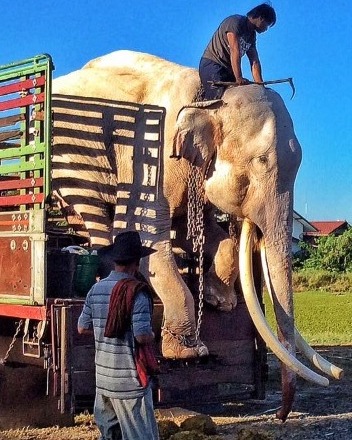In the world of animals, elephants are often seen as gentle giants—creatures with immense strength and intelligence, yet known for their calm and nurturing nature. Unfortunately, despite their dignified presence, many elephants around the world have endured long lives of captivity and exploitation, especially in places where they’re used to entertain people. Whether it’s in circuses, zoos, or at popular tourist events, elephants are too often treated as commodities rather than sentient beings. One such elephant who lived through this heartbreaking reality is Thong Bai, a giant bull elephant who spent decades under human control before finally gaining his freedom.

Thong Bai is no ordinary elephant. In Thailand, where elephants are deeply respected and even revered, Thong Bai holds a special place in the cultural fabric. For years, he stood as the symbol of Surin Province—an area of Thailand famously known as the land of elephants. But despite his symbolic status and majestic appearance, Thong Bai’s life behind the scenes was far from royal. For over 40 years, he was used to promote tourism and entertainment. His image was featured in everything from beer advertisements and films to lavish weddings. Everywhere he went, Thong Bai drew attention, but it came at the cost of his freedom and well-being.
This legendary elephant’s life began to change when he came under the attention of Saengduean “Lek” Chailert, a well-known animal activist and the founder of The Elephant Sanctuary. Lek has spent her life fighting to protect elephants across Thailand, providing safe spaces for abused and abandoned elephants to heal. Through her social media platforms, particularly Facebook, Lek has shared countless stories of elephants in need—raising awareness and inspiring change. Thong Bai was one of the many elephants she advocated for. “More than forty years he has served people, and he deserves his freedom,” Lek once wrote, capturing the depth of compassion she felt for this noble animal.
Despite his decades of captivity, Thong Bai’s story was about to take a hopeful turn. A year before his eventual release, Lek brought Khun NuNa Silpa-archa, a government official and animal welfare supporter, to visit Thong Bai and other elephants in Surin Province. Witnessing firsthand the conditions under which these elephants lived, and seeing Thong Bai’s grandeur and calm spirit, Khun NuNa was moved. It was a turning point. She saw the injustice, and rather than walking away, she decided to take action. She began working tirelessly to help free Thong Bai and the other elephants who had known nothing but chains and commands.
Through collaboration, persistence, and compassion, Khun NuNa succeeded. After a year of effort and negotiation, she and other activists were able to reach an agreement with the elephant’s private owner. Under this agreement, Thong Bai would be allowed to live freely within a secure, spacious enclosure—a step toward justice and dignity. This new home became part of the Surin Project, a broader initiative aimed at improving living conditions for working elephants and supporting the livelihoods of mahouts (elephant caretakers) in the region.
The journey to freedom didn’t stop with a simple agreement. It took the support of an entire community to bring Thong Bai’s new home to life. Local people came together to build a proper shelter for him, ensuring it had everything an elephant could need—plenty of mud to roll in, shaded areas to rest, a fresh water fountain, and wide open spaces where he could roam without chains. The government of Surin Province took care of preparing the land, while the Thai Beverage company contributed funding to construct the enclosure. What once was a dream began to take real, tangible form.
Then came the day everyone had been waiting for. The moment when Thong Bai, the symbol of Surin, was finally free from his shackles. The images shared on social media told a powerful story: a giant, majestic creature stepping cautiously into his new life, unsure of how to react to the freedom he hadn’t known in over four decades. “The day that everyone longed for has finally arrived,” Lek wrote in an emotional post. “Over four decades of shackles and at last release. Thong Bai, the Legend of Surin, is free from his chains. We welcomed him to his new home today. He appeared uncertain and nervous of his new freedom and even shy to explore without being told what to do.”
It’s a moment that leaves a deep impact—not just because of the joy of one elephant’s freedom, but because of what it represents. Thong Bai’s release is a symbol of hope for all elephants still living in captivity. His story shows what’s possible when people care enough to act—when communities unite, when leaders listen, and when compassion outweighs profit.
At Newsner, we have long brought attention to the cruelty animals endure when they are forced to perform for humans. Elephants, despite their intelligence and emotional depth, have too often been robbed of their natural lives just to amuse crowds or decorate social events. No animal deserves such a fate. Thong Bai’s story is a reminder of that truth. While his tale ends in freedom, countless others remain behind bars, still waiting for their day to come.
That’s why it’s so important to share stories like Thong Bai’s. They raise awareness. They inspire change. They make people pause and question the systems we’ve come to accept as normal. Let this not be just a heartwarming tale, but a wake-up call. We have the power to change the lives of animals suffering in silence. One voice can spark a movement. One share can make a difference.
So if you believe that no animal should be chained for entertainment, help spread this story. Share it with your friends, your family, and your community. Let Thong Bai’s freedom remind us all that compassion is stronger than tradition—and that every living being deserves to live with dignity, respect, and peace.





